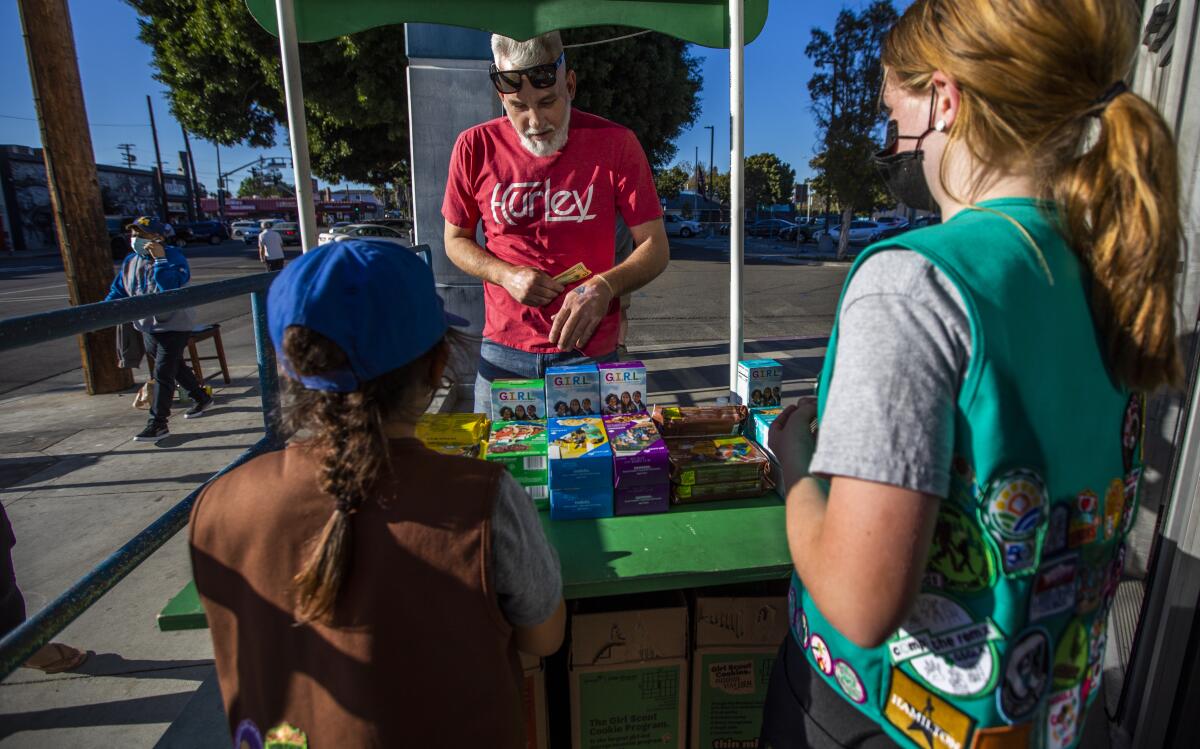Commentary: Stop pressuring Girl Scouts to be ‘cookie bosses’

I am not a cookie hater. Honest. Back in 2005, I even wrote an editorial defending Cookie Monster’s right to gobble as many treats as he wanted, whether or not he ate vegetables and fruits beforehand.
The Girl Scouts are great, too. My girlhood memories of Troop 10 are entirely fond, and it was thrilling to see my granddaughter sign up as well a couple of years ago.
That was when I learned, though, that the relationship between Girl Scouts and cookies had changed. Cookie sales were no longer the pleasant, low-key experience of my childhood, when I would ask neighbors if they would like to buy a box or two and looked forward to my family’s purchase of a couple of boxes of Thin Mints — never enough for my greedy taste buds.
California has protected the rights of transgender students for years with few complaints or problems. Now a push for a ballot measure to end that is underway.
Like so many other kids’ activities, cookie sales have gone high-pressure. Families are encouraged to commit to taking on hundreds of boxes to sell (I called it a phenomenal year if I sold 35 boxes). They are expected to pay the troop for the unpurchased cookies.
Cookie sales, in these helicopter-parent days, are no longer just about raising a few bucks for the troop. No, now it’s an activity that teaches scouts entrepreneurial skills. They are rewarded with badges such as: cookie boss, cookie networker, cookie innovator, cookie market researcher and cookie influencer. It’s a long way from the usual badges for first aid, naturalist and, these days, robotics.
It’s like they’re prepping their resumes for Harvard Business School applications. And here I’d innocently thought for years that learning to make butterfly bandages as a scout was a big enough accomplishment.
My daughter asks if it’s always going to be this hard to sleep. Is there something wrong with her? Here is my answer.
There’s a commission system of sorts. This year, selling 355 boxes will earn a stuffed toy axolotl, an adorable, endangered Mexican salamander for the properly networking, influencing scout. Ritzier awards go to those who sell more, and there are booby prizes as well such as axolotl socks for the scout who sells just 125 boxes. There’s also a “Crossover Avatar Patch” with a complicated list of requirements that I refuse to ponder.
What I do know is that none of this feels like the values of scouting with which I was most familiar — service, exploration and life skills, a healthy counterweight to materialism and peer pressure. I guess these days marketing is considered a basic life skill.
Nor do I like the idea of putting scouts in competition with each other for prizes (or by posting their sales online, as some troops have done), especially when some are in a better position to bring in customers. Some parents can afford to do a big purchase and just hand out boxes as gifts. Other parents have workplaces that make it easy to inveigle coworkers into purchasing, or have large social networks. These have nothing to do with a girl’s cookie-wrangling skills.
We have become tethered to quantifiable, competitive ways of judging how we educate our kids. Classical music and most other art don’t fit into that box.
Because, let’s face it, the girls making mega-sales are seldom accomplishing this themselves. Their parents, usually their moms, are the real “cookie bosses.” They’re the ones posting for customers on Nextdoor and Facebook and taking dozens of boxes to work. My daughter tells me about a scout mother who has developed a sophisticated spreadsheet to track sales; another slaps big “Ask Me About Girl Scout Cookies” signs on her car doors. (You can find them on Amazon, $40 a pair.) How is a girl learning to be a “cookie innovator” when her parents are doing the work?
There are parents who are sick of it, too. One ranted on an online forum in 2016: “This [scout leader] ordered literally hundreds of boxes of cookies per girl, completely ignored everyone’s estimates on how many we thought we could sell, and now is in an absolute rage that we couldn’t sell them all.... Now she’s trying to tell me that our family will be financially responsible for the cookies that didn’t get sold. Yeah, I don’t think so.”
“When little Sally from the troop is selling 142 boxes I’m suddenly looking through the contact list on my phone to see who we can put the heat on next,” another mother wrote on PopSugar.
Scouting is a good cause for our generosity; my own way of dealing with it is to carry $5 bills to hand to the girls outside the supermarket. I will help the troop, but I will not help scouts get axolotl socks.
By all means, sell cookies (though am I the only one to whom the Thin Mints don’t taste the same anymore? Is that just age?). The public loves them; people go searching for Girl Scout cookies as soon as the season arrives. But let’s stop pressuring the girls to sell and pretending they are learning valuable, badge-worthy life skills. Instead, let’s find easygoing projects for them to support their troop financially in more meaningful and appropriate ways.
What I have long fantasized about is a different kind of fundraiser: One in which troops sign up for community service projects such as weeding the gardens of elderly or disabled neighbors, picking trash off the beach, and putting on skits to entertain the residents of a nursing home. They then sign up good-hearted sponsors for each half-hour of work they do at whatever rate those sponsors choose and can afford. No rewards except those of goodwill and giving to others.
You know, the stuff of Girl Scouts.
More to Read
A cure for the common opinion
Get thought-provoking perspectives with our weekly newsletter.
You may occasionally receive promotional content from the Los Angeles Times.














